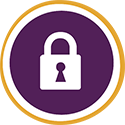You don’t need to be a superhero to protect your savings.
Whether banking online or withdrawing money overseas, we've got you covered. We use the latest systems and technology to ensure your savings are safe with us. But when it comes to protecting yourself, there are many smart ways to stay safe.

Check your bank accounts.
Check your bank accounts regularly so that you can notice suspicious transactions quickly.

Passwords are only for you.
Never share your passwords or PINs. Make sure you change them from time to time and ensure they are secure.

Know who you are dealing with.
If you meet someone online or are unsure if it is a legitimate contact from a business, then take some time to research it first.
Mobile App security features.
Our award-winning Mobile Banking App is feature-rich. Specify controls and preferences to alert you of any suspicious activity on your accounts.
For example, you can enable banking alerts for key actions such as when an OSKO payment or direct debit occurs, or when a new device has been registered.
You can also reduce transaction limits, set amount threshold alerts on your accounts and cards, and create system alerts for events, including when payment for a credit card or loan is due.
Download our step-by-step guide on how to customise the security settings on your Mobile App.
Online security.
It’s easy to become complacent. We live in a world of constant online updates, and password paralysis can set in when we’re faced with yet another sign-in page. But that’s no reason to let our guard down when it comes to banking online.
Protect yourself
- Maintain an adequate level of anti-virus software on your computer
- Delete emails and attachments if they seem suspicious – it may be a virus!
- Beware of emails with ‘friendly’ headings from addresses you don’t recognise
- Set your spam email preference as high as possible
- Choose a secure password and change it regularly.
We will never send you an unsolicited email requesting personal information, or details about your passwords / PINs etc. If you ever receive an unsolicited email claiming to be from us, or from another Financial Institution, requesting that you provide this type of information, it may be a scam so check with us before you respond.
Mobile security.
Fraudsters have developed a technique to intercept the onetime passcodes sent to mobile numbers via SMS to authenticate transactions processed via internet banking and other channels. This involves transferring or ‘porting’ your mobile phone to another mobile provider without your knowledge. After they’ve ported your mobile number they can then intercept the SMS code we send you to authenticate a transaction to conduct fraudulent transactions on your account.
Be alert
If you notice that your mobile phone has unexpectedly stopped working, contact your provider immediately to confirm why your service has stopped. If your mobile number has been ported, contact us immediately so we can protect your account against fraud.
ATM and card security.
You may have heard these before, but we think it’s better to be safe than swindled.
Smile for the camera
- Cover the keypad as you enter your PIN into an ATM
- Use a different ATM if it appears to be https://west-vale-union.com/theme/assets/styles/damaged and notify the owner if possible
- Change your PIN regularly - but don’t use a PIN that easy for others to guess (like your date of birth)
Swipe away safely
- Check your EFTPOS receipts for any irregularities or inconsistencies
- Check your account statements regularly and be aware of your balance
- Do not write your PIN anywhere.
Protecting yourself from scams.
How might scammers contact you?

Phone calls.
Unexpected phone calls from individuals claiming to be from your bank, insurance, or utility company, or even a government department or organisation, like the ATO. They may ask for personal information.

Text messages.
A text message asking you to click on a link or sign up to win or verify something.

Emails.
Links in emails, from an address impersonating someone else.
Remember:
If you are not expecting a phone call, email, or text message, do not provide any personal information. Do not call the number provided or click on any links. Find your institution’s phone number or website and contact them directly to verify.
Security FAQs.
How we can help?
If you think you have been scammed, start by calling us or visiting your local branch.
